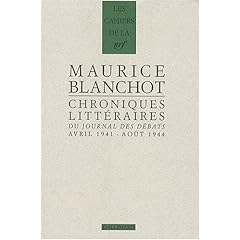Review of Blanchot's "Chroniques Littéraires"
Cautious minds might be surprised at first glance to note that just a few years after Maurice Blanchot’s death, and to honor the centennial of his birth, Gallimard (under the imprint Les Cahiers de la NRF) has published a book by Blanchot that has such a “journalistic” title. Nothing could seemingly be further from a newspaper review than the work of the man who introduced us to a concern for “plain” speech, the search for the “neuter,” and an obsession with purity in literature. The titles of the collections of essays by the author of The Space of Literature in fact resound in our ears like so many denials of that non-essential speech, that stream of inchoate words that in Blanchot’s view, following the traces of the Mallarméan precept, are the characteristic of oral communication, a communication that will never “make up for the defects of language,” whose insistent rumor journalism, especially these days, so often takes pleasure in spreading. What’s more, we know the symbolic, if not falsely polemical, quality of the dates themselves on which Blanchot published these articles, from April 1941 to August 1944. Evil dates, according to some distasteful inquisitors, who will note that the Journal des Débats was one of the publications authorized by Vichy. To those people one can only counter with the lucidity of the texts and this plea for freedom, which appears in the course of an article on Tocqueville where Blanchot exalts “the spirit of discernment during a time when the unquestioning mind was triumphing, the purely intellectual passion to know and not to be duped when enthusiasm is driving everything, even politics.” How can we not see this as an indictment in miniature of the totalitarian inclinations that dominated Europe at the time? Of course we have to admit that by his deliberately “disengaged” position, hostile to any partisan spirit and to any stance that might betray his systematic mind, this close friend of Emmanuel Levinas would always remain the custodian of a distinct tradition that holds art as something that cannot be appropriated by the sirens of current events, even if they be malevolent. Some might find this displeasing, and it is true that Blanchot’s aristocratic taste for shadow and secrecy may have given rise to a number of questions. But that a writer so sure of his resources could claim as his own the sole happiness of meditating on literature and “on the silence unique to it,” to use the expression that figures as an epigraph in a number of the first editions of his texts, no doubt seemed too strong for some to ignore.
You can read the rest of the review here.


 Poasis II: Selected Poems 2000-2024
Poasis II: Selected Poems 2000-2024 “Todesguge/Deathfugue”
“Todesguge/Deathfugue” “Interglacial Narrows (Poems 1915-2021)”
“Interglacial Narrows (Poems 1915-2021)” “Always the Many, Never the One: Conversations In-between, with Florent Toniello”
“Always the Many, Never the One: Conversations In-between, with Florent Toniello” “Conversations in the Pyrenees”
“Conversations in the Pyrenees” “A Voice Full of Cities: The Collected Essays of Robert Kelly.” Edited by Pierre Joris & Peter Cockelbergh
“A Voice Full of Cities: The Collected Essays of Robert Kelly.” Edited by Pierre Joris & Peter Cockelbergh “An American Suite” (Poems) —Inpatient Press
“An American Suite” (Poems) —Inpatient Press “Arabia (not so) Deserta” : Essays on Maghrebi & Mashreqi Writing & Culture
“Arabia (not so) Deserta” : Essays on Maghrebi & Mashreqi Writing & Culture “Barzakh” (Poems 2000-2012)
“Barzakh” (Poems 2000-2012) “Fox-trails, -tales & -trots”
“Fox-trails, -tales & -trots” “The Agony of I.B.” — A play. Editions PHI & TNL 2016
“The Agony of I.B.” — A play. Editions PHI & TNL 2016 “The Book of U / Le livre des cormorans”
“The Book of U / Le livre des cormorans” “Memory Rose Into Threshold Speech: The Collected Earlier Poetry of Paul Celan”
“Memory Rose Into Threshold Speech: The Collected Earlier Poetry of Paul Celan” “Paul Celan, Microliths They Are, Little Stones”
“Paul Celan, Microliths They Are, Little Stones” “Paul Celan: Breathturn into Timestead-The Collected Later Poetry.” Translated & with commentary by Pierre Joris. Farrar, Straus & Giroux
“Paul Celan: Breathturn into Timestead-The Collected Later Poetry.” Translated & with commentary by Pierre Joris. Farrar, Straus & Giroux
Thank you!